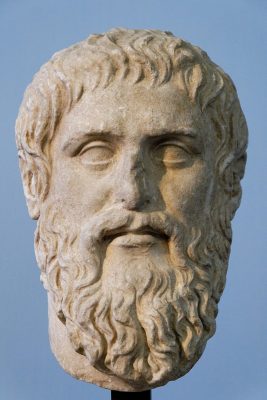Plato is one of the greatest philosophers of ancient Greece. He was the founder of the Academy and wrote ideas on beauty, political philosophy, ethics, and art. Plato was born to parents who were both descendants of wealthy Athenian families. His father was Ariston of Collytus, and his mother was Perictione. Plato had a sister named Potone, two brothers named Glaucon and Adeimantus, and a stepbrother named Antiphon.
Ariston
Plato’s father was Ariston, a man born in Athens and who lived in the district of Collytus. According to legend, Ariston asserted that he was a descendant of the ancient Athenian King, Codrus, and the king of Messenia, named Melanthus. Through these two kings, Ariston claimed that he was a descendant of Poseidon, the god of the sea.
The Greek biographer, Diogenes Laertius, narrates that Ariston tried to rape Perictione while she was a very young woman. However, Ariston failed in his attempt, and shortly afterward, Apollo visited him in a vision. Apollo’s apparition made Ariston decide not to try to rape Perictione again. Perictione eventually gave birth to Plato. Ariston and Perictione had two other sons, Glaucon and Adeimantus, and a daughter named Potone.
When Ariston died, Perictione married again, this time to the Athenian politician, Pyrilampes. With his second husband, Perictione had a son named Antiphon.
Perictione
Plato’s mother, Perictione, came from a prominent family. One of her ancestors was Solon, the Athenian lawmaker. She was also a relative of Dropides, an administrator of the year 644 B.C., who was also related to Solon. Perictione married Ariston and had three sons with him: Glaucon, Plato, and Adeimantus, and a daughter named Potone.
Two literary works have been credited to Potone: “On Wisdom” and “On the Harmony of Women.” On Wisdom discusses a definition of wisdom in a philosophical light, while On Women discusses a woman’s obligations to her husband. However, these works were discovered to come from different periods, and scholars eventually concluded that Perictione was not the author of any of the two.
Potone
Potone was the elder sister of Plato. She was married to Eurymedon of Myrrhinus, a district in ancient Attica. Potone gave birth to a son named Speusippus, who grew up to be a philosopher. When Speusippus was 60 years old, his uncle, Plato, died. As a result, Speusippus took charge of the Academy and managed it until he was 68.
Glaucon
Glaucon was Plato’s elder brother and is popularly known as an important conversation partner of Socrates in Plato’s Republic. He was born in Collytus and was among the wealthy young men who studied under Socrates. Not much is recorded about Glaucon’s life, but a little information can be gathered from Plato’s writings. His name is taken from the Greek word glaukommatos, meaning “gray-eyed” or “bright-eyed.” Scholars are not sure whether the name was given to Glaucon when he was born, as a nickname or a byname to describe his eyes. It is not surprising if it was a byname since the name Plato itself is a byname, which means “wide.” Plato’s given name was Aristocles, and the byname given to him probably described his wide shoulders that grew big because of his training in wrestling.
Glaucon fought in the Battle of Megara and was praised for the merits that he had shown in battle. There is no record of Glaucon’s occupation. However, it does not matter if he was employed or not since he came from a wealthy family. Nothing is known about his lovers if he had any. According to Socrates, Glaucon was a musician and was versed in musical theory. This may probably be true, as many Athenians analyzed Pythagoras’ musical theories during Glaucon’s time.
Adeimantus
Not much is known about the life of Adeimantus. However, scholars are able to get glimpses of Adeimantus’ temperament in Plato’s Republic, where he gives importance to education. In other parts of the Republic, Adeimantus expresses his worry about the auxiliaries, or warriors, in Plato’s perfect society, raising the issue of whether they could be happy with the little property they own.
Antiphon
Antiphon was Plato’s maternal half-brother. In Plato’s Parmenides, Antiphon is portrayed to have rejected philosophy and instead spent his time taking care of his horses.
